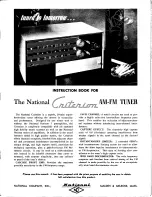
English
19
En
Connecting Your Equipment
AC IN
CONTROL
CENTER
L
R
L
R
IN
OUT
SPEAKERS
FRONT
SURROUND
AC IN
CONTROL
CENTER
L
R
L
R
SUB
WOOFER
OUT
OUT
F M UNBAL75
Ω
AM LOOP
MONITOR
OUT
DVD
DVD
(DVD)
COA X
R
R
AUD IO
DIGITAL IN
AUDIO
VIDEO
L
L
ANTENNA
1
2
IN
OUT
SPEAKERS
FRONT
SURROUND
DVR /
VCR
DVR /
VCR
DVR /
VCR
IN
T V/
SAT
T V/
SAT
IN
IN
OPT1
OPT2
( T V /
S AT )
Operating other Pioneer Components with this Unit’s Sensor
By connecting a control cord to the CONTROL terminals of the respective equipment, you can control several Pioneer
components using one remote sensor. Following the diagram below you will see that one component feeds the
CONTROL OUT terminal and on the other end another component is connected to the CONTROL IN terminal. The
component that is the end point (the one that has a cord hooked up to its CONTROL OUT only) it is the component
whose sensor you will use. Point the remote control at that sensor when you want to operate the any of the equip-
ment connected by this system. In the example below you would point the remote control unit towards the remote
sensor of the equipment on the left.
• You can also control Pioneer components by pointing the receiver's remote control directly at the component.
This type of operation does not require control cords. See page 47 for more information.
• To use this kind of remote control you have to hook up a control cord AND the have the component and receiver
hooked up with analog RCA audio/video cords as well (see pages 12–15).
Plugging in the Receiver
After you have connected all your components, including the speakers, plug the receiver into a wall outlet.
Mono mini plug
(optional)
Mono mini plug
(optional)
Point remote control towards
remote sensor of component
that only has a cord connected
to its CONTROL OUT
terminal
• The power cord is removable from main unit for storage.
to wall outlet
Power cord CAUTION!
Handle the power cord by the plug. Do not pull
out the plug by tugging the cord and never
touch the power cord when your hands are wet
as this could cause a short circuit or electric
shock. Do not place the unit or a piece of furni-
ture, etc., on the power cord, or pinch the cord.
Never make a knot in the cord or tie it with
other cords. The power cords should be routed
such that they are not likely to be stepped on.
A damaged power cord can cause a fire or give
you an electrical shock. Check the power cord
once in a while. When you find it damaged,
ask your nearest PIONEER authorized service
center or your dealer for a replacement.
Components with
an CONTROL
terminals
Components with
an CONTROL
terminals
















































